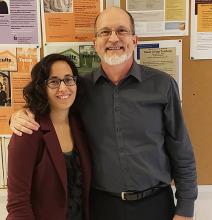
Amber Vu successfully defended her PhD thesis, "Mechanisms of nuclear lamina disruption and regulation of nuclear budding of HSV-1" on Wednesday, September 26, 2018. She is pictured here with her mentor, Dr. Richard Roller.
Research
During Herpes Simplex Virus 1 (HSV-1) replication, newly formed capsids must escape the nucleus to undergo maturation into an infectious virus particle in the cytoplasm. This process of escape, termed nuclear egress, involves viral disruption of the nuclear lamina, capsid docking and envelopment at the inner nuclear membrane, and de-envelopment at the outer nuclear membrane. Critical viral factors for nuclear egress are pUL31 and pUL34, which interact to form heterodimers and larger hexameric arrays that drive membrane budding.
Point mutants that are deficient in specific steps of the nuclear egress pathway are powerful tools to study the underlying mechanisms of nuclear egress.
One such UL34 mutant, UL34(Q163A), is unable to cause gross changes in lamin A / C networks. Through characterization of UL34(Q163A) and selection of extragenic suppression, we challenge the notion that gross disruption of the nuclear lamina is required for efficient viral replication.
A UL34 double mutant, UL34(CL13) causes unregulated budding at the inner nuclear membrane. Through characterization of the single mutations of UL34(CL13), R158A and R161A, we are able to explore the impact of membrane budding regulation on viral replication and cell-cell spread.
Altogether, my studies show that while nuclear egress is a required process for HSV-1 replication, specific steps of this pathway may not affect virus growth.
About Amber
Amber grew up in Dallas, TX, Knoxville, TN, and Austin, TX. As a child, she developed a passion for music, learned to play the viola, and enjoyed performing with various orchestras, chamber ensembles and church bands. Amber attended Bearden High School and Stony Pont High School, where she earned a top chair position in the All-Region Orchestra, earned an officer position in Naval Junior ROTC, and gained an interest in virology by taking a human infectious disease class.
Amber attended Baylor University in Waco, TX where she received a B.S. in Biology and minors in Chemistry and French in 2013. She became exposed to research by working in the lab of Dr. Tamarah Adair, in which she determined the host range of bacteriophages isolated from Staphylococcus aureus strains taken from the nasal passages of Baylor students. Wanting to continue doing research, she participated in the summer REU program at The University of Iowa in 2012. She worked under Dr. Mike Feiss, studying the ability of bacteriophage lambda terminase protein mutants to package DNA. Through her REU experience, Amber came to love research and decided to pursue it as a career.
Amber entered the Microbiology Ph.D. program at The University of Iowa in the fall of 2013. She has worked in the laboratory of Dr. Richard Roller on determining the mechanistic functions of pUL34 in the nuclear egress pathway of Herpes Simplex Virus 1.
Following graduation, Amber will begin a postdoctoral position in the lab of Dr. Paul McCray at The University of Iowa. Outside of the lab, Amber enjoys spending time with her husband, Bao, and their daughter, Belén, watching 90 Day Fiancé, and decorating cakes.